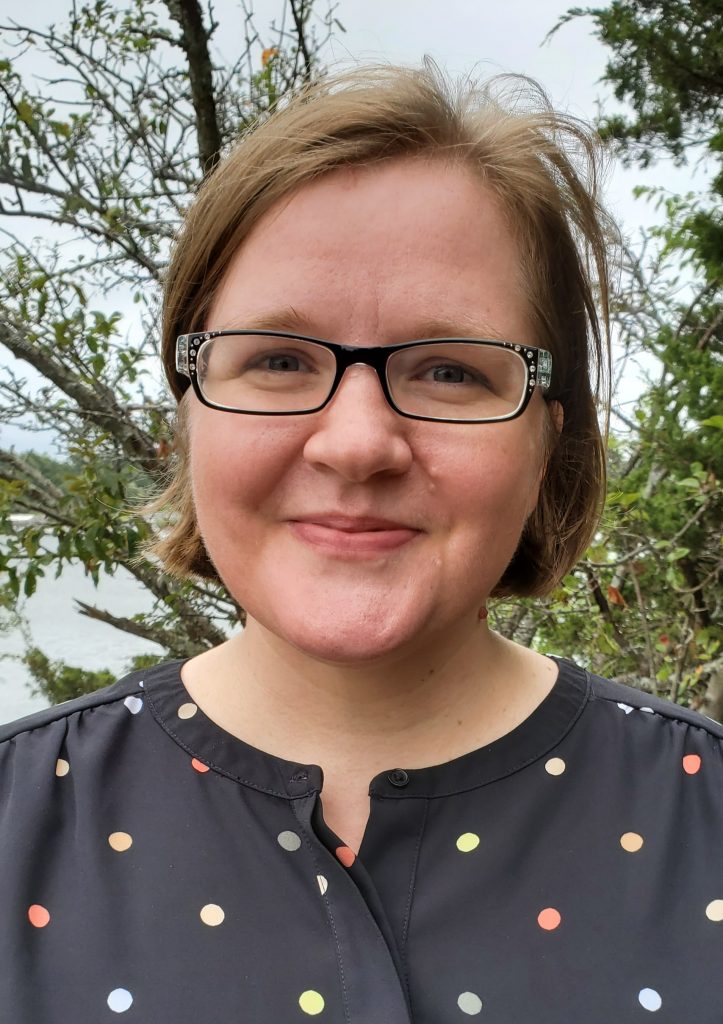Our Director of Family Ministry
Rev. Sierra-Marie Gerfao

As Director of Family Ministry (formerly called Religious Education for Children and Youth) at the Unitarian Universalist Congregation of Danbury, the Rev. Sierra-Marie Gerfao is a creative, big-picture thinker with a depth of experience as a longtime Unitarian Universalist religious educator. (Sierra-Marie’s pronouns are she/her/hers, and her last name is an Irish-Portuguese hybrid pronounced “JER-fay-oh.”) She has served congregations in Washington state, Massachusetts, and Connecticut. She is known for her expansive understanding of the work of religious education, a relational and family-centered approach, and developmental insight.
Rev. Sierra-Marie is committed to justice and liberation. She is currently completing her first theological book, which, among other things, proposes a theology of liberation for disabled folks. She also says that being queer and disabled is a strong part of her own identity, and her commitments to justice and liberation are a feature of how she thinks about religious education. Citing the work of the Rev. Rebecca Parker, she says religious education is “humanization in the context of dehumanizing forces.”
Rev. Sierra-Marie has a Bachelor of Science in Community Health from the University of Northern Colorado, a Master of Social Work from Yeshiva University, and a Master of Divinity from Yale Divinity School. In 2012 she was a Ministry Fellow with the Fund for Theological Education. Her fellowship project involved researching the development of qualities of strength, closeness, and resilience in religiously liberal families. Rev. Sierra-Marie was ordained as a Unitarian Universalist Minister in 2021, and her other part-time work is an experimental ministry of public theology.
Originally from New Mexico, Rev. Sierra-Marie lives in New Haven, CT with her wife, two teenage children, and an eighty-five pound dog. She loves to hike with her dog, swim, and watch women’s hockey and women’s basketball.
Here is what The Reverend Sierra-Marie Gerfao wrote for the Danbury News-Times Forum on Faith: Through Old Stories We Remember and Learn (to read the original) December 4, 2021
My family is in mourning for my mother-in-law, whose death came at the end of November. As people in mourning often do, we have found ourselves telling stories, recalling memories of our beloved deceased.
There is a video clip that has been making the rounds recently on social media, in which actor Andrew Garfield tells “Late Show” host Stephen Colbert that grief is love we have not been able to express. Garfield thanks Colbert for asking about Garfield’s mother. “I love talking about her,” Garfield says.
Indeed, my family will be expressing our love for my mother-in-law for years to come, by telling stories about who she was and the varied ways she shared her love with us. We love talking about her. But while family stories are some of the most frequently repeated stories, we repeat stories of all types, over and over.
The instinct to retell stories is so natural and common a human experience that it begins when we are babies, taking pleasure in books that are repeatedly shared with us. Toddlers often seek the same books again and again, even asking for stories to be read to them multiple times in a row. As they get older, many children act out variations of the same stories in their play.
We repeat stories from our lives for a variety of reasons. For example, we use repetitive storytelling to process experiences and organize and integrate new information, but we also use repetitive storytelling to gain different insights from different friends.
Similarly, in faith communities, the repetition of particular stories serves various purposes. For example, we may tell stories to teach, to remember or commemorate, or to regularly refocus our attention.
Jewish people currently celebrating Hanukkah may be sharing the story of the rededication of the temple in Jerusalem. Christian people celebrating Advent at this time may be talking about the road to Bethlehem. The stories get repeated every year. (In my own religious community, Unitarian Universalism, we come together not by way of shared beliefs, but more so by way of shared values and commitments, so there are people who tell each of these stories, and people who tell other stories as well.)
Just as naturally as it is for many of us to repeat stories, however, so too is it natural and common to lose interest in often-repeated stories. We may find our mind drifting when a friend or relative unintentionally repeats a story they have told us a time or two before. We may find ourselves tempted to rush through the telling of a religious story that feels all too familiar.
When we rush through the telling of the stories our communities have selected for regular retelling, when we reserve the repetition of stories solely for the education of children, and when we consistently favor first encounters with new stories over the experience of hearing old stories again, however, something is lost. Aside from losing layers of meaning that occur when we encounter the same stories at different points in our lives, we lose the opportunity to be changed by the stories over time.
